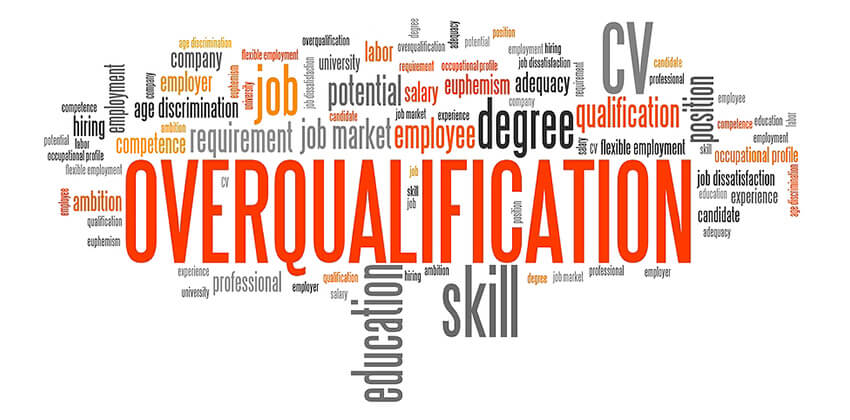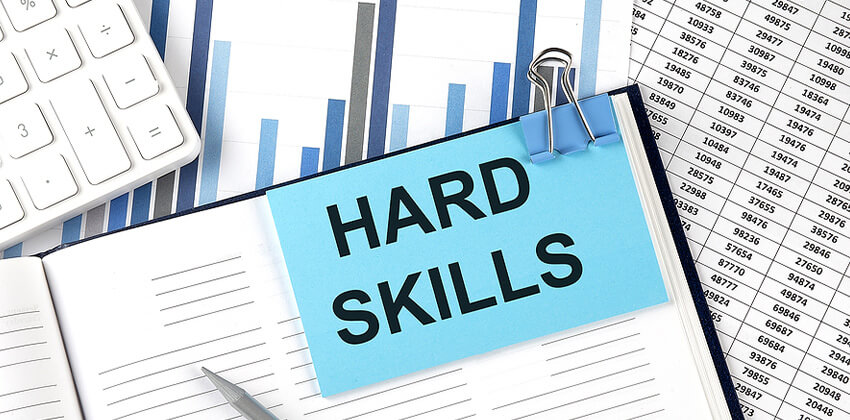
There is no argument that ageism is rampant in the US, and many are finding themselves in the most difficult searches of their lives. Why is this happening?
The short version is this: the Internet means 700 people apply, and it used to be 37.
Also the pace of business has never been faster.
Everyone is overworked, always on, and exhausted. Hiring plans change every few weeks in many public companies.
Add to that, the amount of information everybody is expected to handle has grown exponentially and no one has the time for thoughtful and contextual analysis of your email, cover letter, resume or LinkedIn profile. Don’t make them think! They don’t have time, and it’s not their fault.
Employer Concerns About Overqualified Job Seekers
When they do see your profile or resume, and notice you are older, these are the things they are most worried about:
- You might not have the energy to keep up.
- You will not pull off intense deadlines in a fast paced company.
- You conduct business at a slower pace than they do.
- You bring “baggage” (history), and will tell them why their goals can’t be achieved because you saw the same thing tried in 1987. While they will come to value your experience, they don’t want to get the feeling that you are stuck in processes, etc.
- Your technical skills aren’t relevant, and you will never come up to speed.
- You are more senior than this position, and you are just taking this until you find something better.
- You will be bored and leave.
- You are a classic manager and will no longer roll up your sleeves to be an individual contributor, too.
Yes, these concerns are real. These are the reasons they tell me when we discuss an older candidate’s qualifications. Often, I can counter successfully, the interview is set up, and the person is often hired.
24 Strategies to Beat the Overqualified Label
Though I hate the fact that you need to play it, there is a job search game involving applicant tracking systems, algorithms, and hasty human perceptions.
I do not want to insult your hard-earned experience, but…
Editing for relevance to the exact job, and tweaking some of your presentation to highlight relevant accomplishments, can get you in the door.
I have seen older people bounce, and get hired in the most aggressive business culture we have ever had.
These are the strategies used successfully to be identified as a current contributor:
1. First impressions happen once.
Your profile and followup resume can have a much bigger and lasting impression than anything you say in a phone conversation or over lunch. However, there is simply no point in letting all your friends know you are looking if they can’t immediately see all the ways you might fit in.
So, get your ducks in a row BEFORE you network.
2. Skip the common “Over 20+ years experience.”
It reinforces your age, and it can scare people off who think you might be too expensive. Focus on specific and current skills.
3. If they say they want 5+ years Project Management experience, and you have 17, use 5+.
It will help you in the algorithm, and it’s true.
4. Don’t look so senior that they are afraid you will be bored.
I see resumes and profiles all the time that make candidates look more senior and expensive than they are. Keep it streamlined, and keep it specific.
Concentrate on the last 5-15 years.
If you are in middle management or an individual contributor, 2 pages is fine. If you are an executive, 3 is okay. But if you are open to under $100K positions, consider a one page.
5. Don’t emphasize a VP title if you are open to Director roles, and don’t use Manager if you are open to an individual contributor role.
Use “Leader,” “Head of,” or “Expert.”
6. Name your resume “YourNameSpecialty.”
For example, use ” MarkJonesMarketing,” not “MarkJonesVPMarketingCMO” unless you will not consider any other title.
Name it to make it easy for the employer, not to make it easy for you.
7. Appear relevant.
You have to tell them exactly how you fit, without burying those important details in masses of irrelevant information.
I hear people tell me that they don’t want to “dumb down” their resume. Understood.
But, make it easy for the reader to very quickly see that you are a good fit.
Make it obviously and subliminally clear that you are a potential fit. Editing for relevance shows that you “get it.”
8. Drop details that age you.
If your title was MIS Manager, do enough research on opportunities to know that IT Manager is the modern equivalent.
Similarly, drop skills you haven’t used in the past 10-15 years— it might be DOS or Cobol; in manufacturing it might be Just-in-time, Manman, etc. Instead of mentioning details of loading tapes on mainframes, speak about server operations and support.
Focus on the technical skills you you have used in the last 10-15 years, and don’t continue to remind them of how far back you go.
Keep them focused on your last 10 years of experience.
9. If you do not have the technology skills they want, give examples of being a fast learner with something similar.
If common technologies like MS Office are required by many, consider taking a low cost community college course in it.
10. It is perfectly okay to trim your resume and LinkedIn Profile by not including your early years.
Starting anytime around around 1990-2005. If your early career was in highly desirable companies, keep it. Otherwise trim it. LinkedIn and your resumes should start and stop on the same dates.
11. Highlight your physical fitness.
Mention it if you run marathons, play basketball, climb mountains, or some other activity requiring (and demonstrating) physical fitness.
Find a way to mention these activities that require high energy at the bottom of page 1 on your resume.
Increase your cool factor, and emphasize your energy.
12. Fight their objection before they can even think it.
Tell them when you are high energy, with a strong competitive spirit or if you thrive in fast-paced business/sales/tech/office environments.
If you are accustomed to long hours and global travel, tell them above the fold page 1 in one of your descriptive bullets.
13. Get a great LinkedIn photo that shows you as fitting in to your industry and their “culture.”
Too many profile photos look like mugshots. Research LinkedIn for people that have the jobs you want in companies you want to work in.
In many urban areas, no tie, maybe no jacket. In the midwest, and a conservative sector, maybe a suit and tie is warranted.
A casual shot outdoors, with a winning expression (think World Series) is good for many, a more formal one can be obtained for little money at a local mall. Yes, I have seen candidates rejected for wearing a tie.
[See LinkedIn Profile Photos for People Over 50 for more details.]
14. Get a basic Gmail address for job search.
It makes you look more current. Do NOT use Hotmail, Yahoo, AOL, etc. [See To Be Hired, Be Reachable for details.]
15. Make sure your phone number has the area code you want to work in.
Get a cheap go-phone if you have to or consider using Google Voice. I worked with a Senior Executive who started getting interviews within 3 days of doing this.
Make sure your LinkedIn locale is the largest metro area near you, not just one city. [Again, see To Be Hired, Be Reachable for details on Google Voice.]
16. We are living in a specialist era.
This means you must appear to be a specialist with regard to the job description in order to get traction. So tweak your resume for each opportunity. Keep a master resume or spreadsheet of bullets and tech summaries to be used in different cases.
Make sure your resume has some of the same vocabulary the company is using (a.k.a. keywords). The ATS will note those keywords, and move you up in line.
17. Don’t spend 8-10 hours per day on your job search.
I can hear the career counselors out there cringing because the standard advice is “job seeking is a full time job,” but I recommend 2-5 hours per day max, 5-6 days a week. I’ve seen too many people burn out.
I believe you will actually get more done in 3 hours and be less stressed when you do have an interview.
18. Don’t spend too much time on any one opportunity.
Consider all opportunities have less than a 5% chance of turning into the winner. Spend a little time tweaking, but not hours.
In the past, you would thoughtfully apply for 10 positions, speak with 6 or 7, interview for 3-4 and receive 1-2 offers. Executive turnover was lower, corporate and product direction didn’t change every few months, and hiring plans were solid.
Today you might apply for 100+ possibly, network with 300, and only talk to 7 companies. This is a marathon.
19. Make sure your resume opens cleanly and clearly on all platforms, including a smartphone.
Not kidding. Keep keywords and phrases on the left margin when you can.
Keep formatting very simple. No headers, footers, tables, or font changes.
20. A long cover letter ages you, and 95% of cover letters are not opened.
Those that are read, are rarely seen by more than one person. Often the original screener is the only one who sees it.
But, send one any way if you can (because 5-15% might knock you for not doing it).
Make it very brief. A few sentences maximum, including best times/day/way to reach you and why you are excited about this opportunity and a fit.
“I am quietly looking for my next role and believe I might be a perfect fit for this opportunity from my similar experience at ABC and XYZ Companies. I look forward to discussing my background with you soon. I am available… and the best way to reach me is….”
Not more than this, or the reader’s eyes will glaze over and not absorb a thing. Always leave them wanting to know more.
21. Make sure any important facts are in both your cover letter and your resume.
Cover letter: “I am excited about this opportunity because I have 5+ years in Global Projects, and the car industry knowledge you require.” needs to translate to…
Resume, page 1 bullet:: “5+ years in Global Projects. Auto industry expertise and depth.”
Then, all the readers will be reminded of your strength as a candidate every time they refresh their memories. Make sure that any important conclusions or insights in a cover letter get expressed correctly on your LinkedIn profile, too.
22. Be prepared and composed!
Don’t take a call from a colleague, a recruiter or an employer unless you are ready to accept it!
If you come across as disorganized, scattered, or even hard to hear, you just shot yourself down.
Have a professional voicemail greeting, and be organized and distraction-free when you do take the call, from a quiet place with a clear connection.
23. Radio silence is common.
Don’t take it personally; it is not personal rejection.
Your resume was not seen in many cases.
That’s not fair, but that’s the world today. You are in a pool of 700 possibly, and it used to be 35. And they might have put the job on hold (nothing to do with you).
Check back in twice. If no response, move on.
24. Eat well. Get lots of sleep. Take breaks. Breathe. Exercise.
Join groups if they give you a sense of camaraderie, but leave groups if they depress you. But know that you are not alone. It’s a difficult time. It’s not just you.
The Bottom Line:
While I’ve learned these lessons in Silicon Valley’s very tough job market, they apply to most employers today. If you are an experienced job seeker, over 45, managing these assumptions can make all the difference in the open job market. Changing just a few things can have a big — and positive — impact.
More About Successful Job Search:
- Managing the Age Issue with Recruiters: Age as an Asset
- Real and Effective Networking for Job Search
- Resumes for the Unemployed and Overqualified
- Beating the “Too Old” Bias
- 3 Steps to a Killer Elevator Speech
About the author…
Linda Tuerk is a veteran headhunter who has significant experience getting interviews for older candidates in Silicon Valley. Linda shares her 30+ years headhunting experience to help job candidates. “From Stanford to San Quentin,” she has helped thousands of people navigate their job searches in technology and other sectors nationwide. Linda specializes in finding the most attractive way to tell the truth. She can be contacted via LinkedIn or at 650-210-9980.
Don't forget to share this article with friends!




